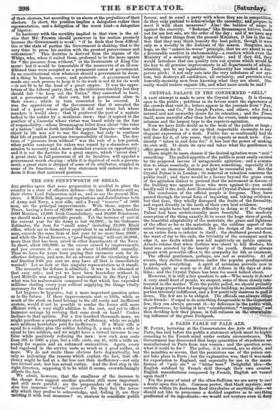THE ONE PENNYWORTH OF BREAD.
ALL parties agree that some preparation is needful to place the country in a state of effective defence—the late Ministers said so, their victor Lord Palmerston said so, and so say the present Min- isters. Alifilitia Bill, improved regulations and distributions both of Army and Navy, a new rifle, and a Naval " reserve " of 5000 men, are the principal improvements. With those, argues the Times, having a force of 60,000 men and officers at home, besides 6000 Marines, 12,000 Irish Constabulary, and 50,000 Pensioners, we should make a respectable parade. Yet the increase of cost in the current year for the Army is but 84,000/. • in the Ordnance Estimates, the item for "small arms," including 23,000 Min% rifles, which are in themselves equivalent to an addition of 25;000 men, exceeds the same item of last year by no more than 2000/ ; and while the Naval Reserve, a "good beginning," will cost 38,0001., more than that has been saved in other departments of the Navy. In short, allow 100,000/. as the excess caused by improvements, and you overrate it—an excess on about 15,000,0001. annually. Thus we have for years been paying that enormous sum for in- effective defences, and now, for an advance of the circulating deci- mal fraction 0.66 per cent we may have all that is immediately wanted! Let us look at this singular representation as it stands.
The necessity for defence is admitted ; it was to be obtained at that easy rate ; and yet we have been heretofore' without it. Lord Melville was arraigned for malversation in the Navy ; but what was his malversation compared to that which has expended millions sterling every year without supplying the things vitally necessary for the country P
Let bygones be bygones; but a more important question arises as to the future. If these improvements cost so little, while so much of the stook on hand belongs to the old costly and inefficient system, would it not be possible to render the forces still more efficient with a very slight addition to the cost, and yet to effect immense savings by revising that same stock on hand? Cocker inclines to that opinion. For a few hundred thousands more, we might purchase a proportionate stock of efficiency, while we might save millions heretofore paid for inefficiency. If a Minis rifle is equal to a soldier plus the soldier holding it, a man with a rifle is equal to two soldiers, and we might have a virtual increase to our force while positively reducing the men : now each man costs from 501. to 100/. a year, but a rifle costs, say 41., with a trifle an- nually for repairs and an enhanced ammunition. Again, every bad vagabond in the service costs as much as a good soldier, or more. We do not recite these obvious facts dogmatically, but only as indicating the reasons which explain the fact, that effi- ciency might be had at a far less cost than inefficiency—not only less virtual cost, but less actual outlay. And the first step in the right direction, supposing it to be what it seems, overwhelmingly attests the fact.
We admit, however, that the smallness of the increase to the charge does suggest another question still more important, and still more painful : are the propounders of this inexpen- sive but immense "reform" sincere? Do they feel the neces- sity which they profess to acknowledge, and, feeling it, are they meeting it with real measures ? or, anxious to conciliate public
favour, and-to excel a party with whom they are in competition, do they only.pretend to acknowledge the necessity, and prepare to meet it with sham measures ? Alas ! the balance of usage is against the sincerity. "Reforms," like Brummagem knives, made not for use but sale, are the order of the day; and if we-have any hope of better things from the present Ministers, it lies in the no- tion that they may think honesty the best policy, though it were only as a novelty in the fashions of the season. Sanguine men hope, on the " cannot-be-worse " principle, that we are about to see a favourable reaction in statesmanship—a reaction which even the Ministry of a minority might institute; and if they did, they would introduce that one quality into our system which would be the key to all genuine improvements in all departments of admin- istration, not to say legislation. Insincerity has reached a dan- gerous pitch; it not only eats into the very substance of our sys- tem; but destroys all confidence, all certainty, and prevents even honestly-meaning men from knowing what they are about. Sin- cerity would restore organic life, and what more needs be said ?


























 Previous page
Previous page